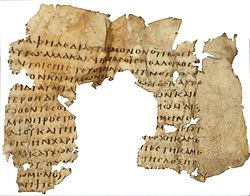Uncial 0220 (in the Gregory-Aland numbering), also known as the Wyman fragment,[1] is a leaf of a third-century Greek codex containing the Epistle to the Romans.
| New Testament manuscript | |
 | |
| Text | Romans 4:23-5:3; 5:8-13 |
|---|---|
| Date | c. AD 250 |
| Script | Greek |
| Found | Cairo, (purchase) Leland |
| Now at | Museum of the Bible |
| Cite | W.H.P. Hatch, A Recently Discovered Fragment of the Epistle to the Romans, HTR 45 (1952): 81-85. |
| Size | 1 leaf; 12 x 15 cm; 14 lines/page |
| Type | Alexandrian |
| Category | I |
| Hand | reformed documentary |
| Note | one deviation from Vaticanus in Rom. 5:1 |
Description
editUncial 0220 measures 8,1 by 11cm. There are 14 lines to a page. The recto (4:23-5:3) is legible, but little can be made out on the verso (5:8-12). The scribe wrote in a reformed documentary hand.
The Alands describes the text-type as "strict".
Uncial 0220 is an important early witness to the Alexandrian text-type, agreeing with Vaticanus everywhere except Rom. 5:1.[2] (See Below) It is classed as a "consistently cited witness of the first order" in the Novum Testamentum Graece.[3] NA27 considers it even more highly than other witnesses of this type. It provides an exclamation mark (!) for "papyri and uncial manuscripts of particular significance because of their age."[4]
The manuscript has evidence of the following nomina sacra: ΚΝ, ΙΥ, ΙΝ, ΧΥ, ΘΥ.
Rom. 5:1:[3]
εχομεν: א1 B2 F G P Ψ 0220vid. 104. 365. 1241. 1505. 1506. 1739c. 1881. 2464. l 846 pm vgmss
εχωμεν: א* A B* C D K L 33. 81. 630. 1175. 1739* pm lat bo; McionT
History
editCurrently it is dated by the INTF to the 3rd century.[5]
It was purchased in Cairo in 1950 by Leland C. Wyman,[6] a professor of biology at Boston University. Later part of it was bought by Martin Schøyen and now part of it is housed in the Martin Schøyen Collection in Oslo, and part in London. In 2012 this text was purchased at a Sotheby's auction by the Green Collection.[7] It will be on the display at the Museum of the Bible in Washington, D.C.[1]
The text was published by William Hatch in the Harvard Theological Review in 1952.
See also
edit- Other early uncials
- Sortable lists
- Related articles
References
edit- ^ a b "The Book Minute". Museum of the Bible.
- ^ Philip W Comfort and David P Barrett, The Text of the Earliest New Testament Greek Manuscripts, (Wheaton, Illinois: Tyndale House Publishers Incorporated, 2001), 696-697.
- ^ a b Eberhard Nestle, Erwin Nestle, Barbara Aland and Kurt Aland (eds), Novum Testamentum Graece, 27th edition, (Stuttgart: Deutsche Bibelgesellschaft, 2001), 60.
- ^ NA27:58.
- ^ "Liste Handschriften". Münster: Institute for New Testament Textual Research. Retrieved 23 April 2011.
- ^ Bruce M. Metzger, Bart D. Ehrman, The Text of the New Testament: Its Transmission, Corruption, and Restoration, Osford 2005, p. 86.
- ^ "SIXTY IMPORTANT MANUSCRIPT LEAVES FROM THE SCHØYEN COLLECTION". Retrieved 14 October 2017.
External links
edit- The Schøyen Collection
- Nikkhah, Roya. "No sexy outfits, nuns told in 1300-year-old 'rule' book," telegraph.com, 17 June 2012, accessed 25 June 2012 - makes mention of the fragment as part of a group of manuscripts to be auctioned at Sotheby's in London in July 2012 by collector Martin Shoyen.
Further reading
edit- William H. P. Hatch, A Recently Discovered Fragment of the Epistle to the Romans, HTR 45 (1952), pp. 81–85.
- Comfort, Philip W.; David P. Barrett (2001). The Text of the Earliest New Testament Greek Manuscripts. Wheaton, Illinois: Tyndale House Publishers. pp. 696–697. ISBN 978-0-8423-5265-9.